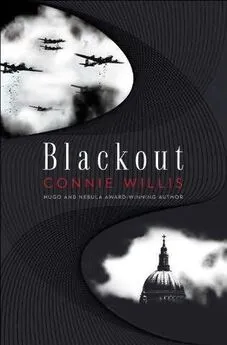Connie Willis - Blackout
- Название:Blackout
- Автор:
- Жанр:
- Издательство:неизвестно
- Год:неизвестен
- ISBN:нет данных
- Рейтинг:
- Избранное:Добавить в избранное
-
Отзывы:
-
Ваша оценка:
Connie Willis - Blackout краткое содержание
In her first novel since 2002, Nebula and Hugo award-winning author Connie Willis returns with a stunning, enormously entertaining novel of time travel, war, and the deeds—great and small—of ordinary people who shape history. In the hands of this acclaimed storyteller, the past and future collide—and the result is at once intriguing, elusive, and frightening.
Oxford in 2060 is a chaotic place. Scores of time-traveling historians are being sent into the past, to destinations including the American Civil War and the attack on the World Trade Center. Michael Davies is prepping to go to Pearl Harbor. Merope Ward is coping with a bunch of bratty 1940 evacuees and trying to talk her thesis adviser, Mr. Dunworthy, into letting her go to VE Day. Polly Churchill’s next assignment will be as a shopgirl in the middle of London’s Blitz. And seventeen-year-old Colin Templer, who has a major crush on Polly, is determined to go to the Crusades so that he can “catch up” to her in age.
But now the time-travel lab is suddenly canceling assignments for no apparent reason and switching around everyone’s schedules. And when Michael, Merope, and Polly finally get to World War II, things just get worse. For there they face air raids, blackouts, unexploded bombs, dive-bombing Stukas, rationing, shrapnel, V-1s, and two of the most incorrigible children in all of history—to say nothing of a growing feeling that not only their assignments but the war and history itself are spiraling out of control.
Blackout - читать онлайн бесплатно полную версию (весь текст целиком)
Интервал:
Закладка:
I can’t do that to them again, she thought, not when they’ll have to face so many real deaths in the four and a half years ahead. She leaned forward and tapped the cabbie on the shoulder. “I’ve changed my mind,” she said. “Take me to Notting Hill Gate Underground Station.”
“But what about your train, miss?”
“I’ll take the next one,” she said.
He made a U-turn and headed back. “Do you want me to wait again?” he asked, pulling up in front of the station.
With the sirens already having gone, the guard wouldn’t let her out of the station. “No, I’ll take the tube from here,” she said, handed him the fare, and ran inside and down to the platform.
“Oh, good, the warden told you,” Miss Laburnum said the moment she saw her.
“Told me what?”
“About the gas leak.”
“A delayed-action bomb went off two streets over and ruptured a gas main,” Miss Hibbard said, coming over with her knitting. “During supper.”
A gas leak! A spark from the taxi’s ignition could have blown us both sky-high.
The rector and Mrs. Rickett were there, and Mrs. Brightford and her girls, all spreading out their blankets. “I’m glad you’re here,” Miss Laburnum said. “We’ve been discussing the play.”
“I can’t stay,” Polly said. “I only came to tell you I won’t be here tonight.”
“Oh, but you must,” Miss Laburnum said.
“We’ve decided the only fair thing to do is put it to a vote,” Mrs. Wyvern said.
Oh, dear, that meant Barrie. Poor Sir Godfrey.
“But Sir Godfrey wants us to wait till Sunday. First he wants us to see a scene from Twelfth Night. The one where Viola longs to tell him of her love, but she can’t because she can’t reveal her true identity-and he wants you to play Viola.”
He was obviously counting on her to help him talk them out of Barrie. But she had to catch the 7:55. “I’m afraid someone else will have to play Viola. I-”
“Oh, but Sir Godfrey insists you do it. He says you’re perfect for the part.”
“I can’t. I’ve had a letter from my sister. My mother’s ill, and I must go home. I only came to tell you so you wouldn’t think-”
“You were killed,” Trot said promptly, and Polly was very glad she’d come, even though it meant she’d missed the 6:48.
“Yes,” she said, “and to tell you I won’t be back till Sunday night at the earliest. It all depends on how my mother is. Tell Sir Godfrey I’m sorry I couldn’t stay, but my train-”
“Of course, you must go. We quite understand,” the rector said, and the others, excepting Mrs. Rickett, nodded sympathetically.
“Thank you. For everything. Goodbye,” she said and hurried off down the platform and along the tunnel, sorry she hadn’t been able to tell Sir Godfrey goodbye, though that was probably for the best. Lying to Miss Laburnum and the rector was one thing, but Sir Godfrey wasn’t fooled nearly so easily. And she wasn’t certain she could have turned him down if he’d asked her to stay and play the part of Viola to his Orsino.
And I must make the 7:55, she thought, hurrying across to the escalator, glancing at her watch as she pushed through the crowd. A quarter past. If there wasn’t too long a wait between trains, she should be able to-
“Miss Sebastian, wait,” Sir Godfrey called. He caught up to her. “I’ve just been told that you are leaving us.”
“Yes. I’ve had a letter saying my mother’s ill.”
“And so you must away to Northumbria?”
“Yes.”
“Forever?”
I should have pretended I didn’t hear him calling me, she thought. And it didn’t matter what she told him, he could see right through her. “I don’t know.”
A look like pain crossed his face, and he said quietly, abandoning his theatrical language, “Are you in some sort of trouble, Viola?”
Yes, she thought. And you were right. Viola’s the perfect role for me. I am in disguise. I can’t tell you the truth.
“No,” she said, hoping she really was the actress he’d said she was. “It’s only that I’m so worried over my mother. My sister says she’s not in any danger, but I’m afraid-”
“That she’s not telling you the truth?”
“Yes,” she said, meeting his gaze steadily. “She knows how difficult it is for me to take time off from my job. That’s why I must go, to see if she’s all right. If it isn’t anything serious, I’ll return on Sunday, but if she’s really ill, I may have to stay for several weeks, or months.”
And you don’t believe a word I’m saying, she thought.
But all he said was, “I wish her a speedy recovery and you a speedy return. If you are not here for the vote Sunday night, I fear I shall be doomed to performing Peter Pan, a fate which surely you would not wish on me.”
Polly laughed. “No. Goodbye, Sir Godfrey.”
“Goodbye, fair Viola. What a pity I never got to act Twelfth Night with you, though perhaps it’s just as well. I should have hated to find myself playing Malvolio, smiling and cross-gartered. And sadly mistaken in thinking the lady cared for him.”
“Never,” Polly said. “You could never play any part but Duke Orsino.”
He clutched his chest dramatically. “Oh, to be twenty-five again!” He pushed her onto the escalator. “Now, begone. Swiftly, that we may meet again. Sunday night at Notting’s Gate when the Luftwaffe roars. Fail me not, fair maid! My life and your good name upon it!” he said and disappeared into the crowd before she could reply.
She hurried toward the Central Line platform. It was already twenty till. I’ll never make it to Euston in time, she thought. Unless by some miracle it’s late.
It was, and it was a good thing-the sirens started up as the 7:55 was pulling out of the station. But even though they’d escaped that, they still spent most of the night stopped due to raids, and most of Saturday forced onto sidings by troop trains, which meant she missed the train from Leamington. The next one wasn’t till morning. “There’s nothing tonight?”
The ticket agent shook his head. “The war, you know.”
And if the morning train was delayed like the one she’d just been on, she wouldn’t make it to Backbury till Monday afternoon, by which time Merope would have left for Oxford to check in. Or would have gone back altogether. “Is there a bus to Backbury?”
The agent consulted a different schedule. “There’s a bus to Hereford, and another that leaves for Backbury from there tomorrow morning at seven.”
It would mean spending the night in the station in Hereford, but at least she would be in Backbury by Sunday, not Monday, and, unlike a train, a bus couldn’t be shunted onto a siding for hours while a succession of troop trains passed.
It could, however, be stopped at railway crossings while those same troop trains crawled by. And at roadblocks, where overzealous Home Guard officers insisted on checking everyone’s papers. She needn’t have worried about spending the night in the station. It was nearly seven in the morning before they reached Hereford.
The bus for Backbury was stopped by a troop train only once and for only half an hour. When the driver called out “Backbury,” it was just a bit after eight. “What time’s the next bus from here back to Hereford?” Polly asked as she got off.
“Twenty past five.”
“In the afternoon?”
“Only two buses a day on Sunday. The war, you know.”
Yes, I do know. But at least there was a train from Backbury. She was glad she’d checked the ABC and found out when it went. Taking the 11:19 would get her back to London far faster than the bus. If she could get to the manor and back in three hours.
And if she could find it. The driver had stopped among a small huddle of shops and cottages. She couldn’t see a manor house. Or a railway station. She turned back to ask the bus driver, “Can you direct me to the manor?” but he’d already shut the door and was pulling away.
I’ll have to ask one of the villagers, she thought, but there was no one in sight. They might be in church. It was Sunday, and even if Backbury didn’t have an early mass, the local equivalent of Mrs. Wyvern might be there arranging the altar flowers. But when she pushed open the door and looked in the sanctuary, she couldn’t see anyone. “Hullo?” she called. “Anyone there?”
The only response was a distant whistle. So I know which direction the railway station is, she thought, going back outside and following the sound and the plume of smoke. She arrived at the station platform in time to see a troop train race by at top speed.
Why couldn’t they have moved that quickly last night? she thought, walking over to the station, though it could hardly be called that. It was no larger than a potting shed. There was probably no point in knocking, but when she did, there was the sound of a cough and then a shuffle and an unshaven and obviously hungover-or drunken-man opened the door.
“I beg your pardon, sir,” Polly said, taking a step back so he didn’t fall on her. “Can you direct me to the manor?”
“Manor?” he said, weaving and squinting blearily at her. Definitely drunk.
“Yes. Can you tell me how to get there?”
He waved vaguely. “Road just beyond the church.”
“Which way?”
“Only goes one way,” he said and would have shut the door if she hadn’t grabbed it and held it open.
“I’m looking for someone who works at the manor. One of the maids. Her name’s Eileen. She cared for the evacuees at the manor. She has red hair and-”
“Evacuees?” he said, his eyes narrowing. “You ain’t here about those bloody Hodbin brats, are you?”
Hodbin? That was the name of the evacuees who’d given Merope so much trouble.
“You’d better not be bringin’ ’em back.”
“I’m not. Does Eileen still work at the manor?” she asked, but he’d already slammed the door, and it would have been on her hand if she hadn’t snatched it away at the last second. “Can you tell me how far it is?” she called through the door, but got no answer.
It can’t be that far. Merope walked it, Polly thought, going back to the church and then along the road beyond it. It was more a lane than a road-and the sort of lane that looked as if it would peter out in the middle of a field-but there was nothing else resembling either a road or a lane, and it led only south. It was also rutted with tire tracks, and Merope had been going to take driving lessons.
But it sounded from what the station agent had said that the Hodbins were no longer here, and if the evacuees had gone home, Eileen would have, too. From what Eileen had said, though, the Hodbins might have been sent home in disgrace. Or shipped off to a reform school.
The lane led past a hayfield and then into woods. There was a scent of rain in the air. Rain, Polly thought. That’s all I need. Merope had better be here, after all this.
Where was the manor? Polly’d already come at least a mile, and there was still no gateway, or, in spite of all the tire tracks, a vehicle in which she could catch a ride. There were only woods. And more woods.
Merope-correction, Eileen; she had to remember to call her Eileen-had said her drop site was in the woods, near the manor house. If she wasn’t there, perhaps Polly could still find it, though if she’d gone back it would no longer be working.
The lane curved to the left. It can’t be much farther, Polly thought, trudging along the ruts, but there was still no sign of a manor house through the woods, or any other house, for that matter, and the lane seemed to be narrowing. And ahead, the woods had been fenced off with barbed wire.
Читать дальшеИнтервал:
Закладка:

![Jane_BlackCat - Понять не поздно... [СИ]](/books/1148838/jane-blackcat-ponyat-ne-pozdno-si.webp)
![Jane_BlackCat - За краем Вечности [СИ]](/books/1148839/jane-blackcat-za-kraem-vechnosti-si.webp)

